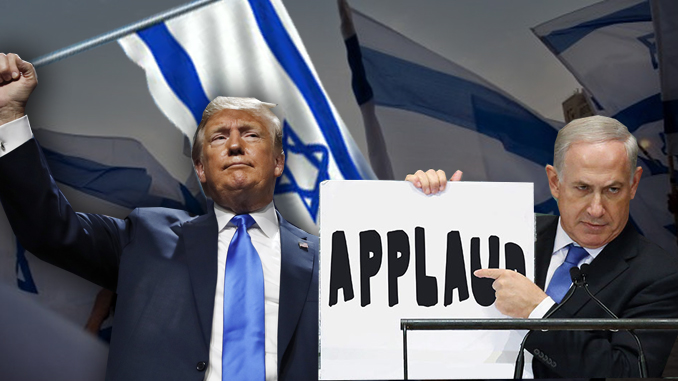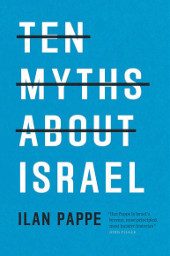
“What Bibi wants, Bibi gets,” writes Pat Buchanan. But war with Iran is not what either U.S. national interests or Trump’s political interests want or need.
By Patrick J. Buchanan
On Monday, President Donald Trump designated the Islamic Revolutionary Guard Corps a terrorist organization, the first time the United States has designated part of another nation’s government as such a threat.
Iran’s Supreme National Security Council responded by declaring U.S. Central Command a terrorist group.
With 5,000 U.S. troops in Iraq and 2,000 in Syria, often in proximity to Iranian units, this inches America closer to war.
Why did we do it? What benefit did the U.S. derive?
How do we now negotiate with the IRGC on missile tests?
Israel’s Bibi Netanyahu took credit for Trump’s decision, tweeting, “Once again you are keeping the world safe from Iran aggression and terrorism. … Thank you for accepting another important request of mine.”
Previous “requests” to which Trump acceded include moving the U.S. embassy to Jerusalem, declaring Jerusalem Israel’s eternal capital, closing the Palestinian consulate and cutting off aid, and U.S. recognition of the Golan Heights, captured from Syria in 1967, as sovereign Israeli territory.
What Bibi wants, Bibi gets.
One hopes his future requests will not include a demand that we cease dithering and deliver the same “shock and awe” to Iran that George W. Bush delivered to Saddam Hussein’s Iraq.
With Bibi’s election win Tuesday, his fifth, the secret Mideast peace plan Trump’s son-in-law Jared Kushner has been laboring on these last two years is likely to be unveiled.
Yet it is hard to see how Jared’s baby is not stillborn.
Bibi is not going to accept a Palestinian right of return to Israel, or a sharing of the Holy City with a Palestinian state ruled by a successor of Yasser Arafat. And as Bibi fought Ariel Sharon’s withdrawal of the 8,000 Jewish settlers from Gaza, he is not going to order the removal of tens of thousands of Jewish settlers from homes on the West Bank.
Indeed, on the eve of his reelection Tuesday, Bibi promised Israelis he would begin the annexation of Jewish settlements on the West Bank.
As for Trump, he is the most popular man in Israel. And he is not going to force Bibi to do what Bibi does not want to do and thereby imperil his major political gains in the U.S. Jewish community.
Given the indulgence of the progressive wing of the Democratic Party for BDS, the anti-Israel Boycott, Divestment and Sanction movement, and the divisions among Democrats over Netanyahu’s expansionism, the president’s pro-Israel stance has proven a political winner for the GOP.
But while a U.S. war with Iran may be what Bibi wants, it is not what America wants or needs.
Consider what 20 years of U.S. wars in the Mideast have cost this country, as China has stayed out of the region and pushed its power and influence into Asia, Africa and Europe.

In Afghanistan, the Taliban have regained control of more territory than they have held since 2001, and they are negotiating with the Americans for a withdrawal of our remaining 14,000 troops.
Cost of the Afghan war: 2,400 U.S. dead, 32,000 wounded, $1 trillion sunk, and the U.S. on the precipice of a potential strategic defeat.
So dreadful has become the five-year Yemeni civil war between Iran-backed Houthi rebels and the Saudi-backed regime they ousted that the U.S. House and Senate have invoked the War Powers Act and directed Trump to terminate U.S. assistance for the Saudi intervention.
In Libya, where a U.S.-led NATO intervention overthrew Colonel Gadhafi in 2011, a renegade general now controls two-thirds of the country and is mounting an assault on Tripoli. U.S. soldiers and diplomats fled the capital last week.
In Syria, President Bashar Assad, with the support of Russia, Iran and Hezbollah, defeated the U.S. backed-rebels years ago.
The Syrian Kurdish militia we partnered with to crush ISIS have been designated as terrorists by the Turks, who promise to annihilate the Kurds if they try to return to homes along the Turkish border.
As for Turkey itself, President Erdogan says he will take delivery this summer of a Russian-made S-400 air and missile defense system.
Go through with that, says the U.S., and we cancel your order for 100 F-35s. The justified U.S. fear: Russia’s S-400 system will be tested against America’s most advanced fifth-generation fighter, the F-35.
If Turkey does not cancel the S-400, a NATO crisis appears imminent.
In Iraq, where 5,000 U.S. troops remain, the government has both pro-U.S. and pro-Iran elements in Baghdad, and mutual designation of the IRGC and CENT-COM as terrorist organizations can only present hellish problems for America’s soldiers and diplomats still in that country.
Bottom line: Though Bibi and John Bolton may want war with Iran, U.S. national interests, based on the awful experience of two decades, and Trump’s political interests, dictate that he not start any more wars.
Not a single Middle East war this century has gone as we planned or hoped.
Pat Buchanan is a writer, political commentator and presidential candidate. He is the author of Nixon’s White House Wars: The Battles That Made and Broke a President and Divided America Forever and previous titles including The Greatest Comeback: How Richard Nixon Rose From Defeat to Create the New Majority, Suicide of a Superpower: Will America Survive to 2025? and Churchill, Hitler and the Unnecessary War, all available from the AFP Online Store.
COPYRIGHT 2019 CREATORS.COM





